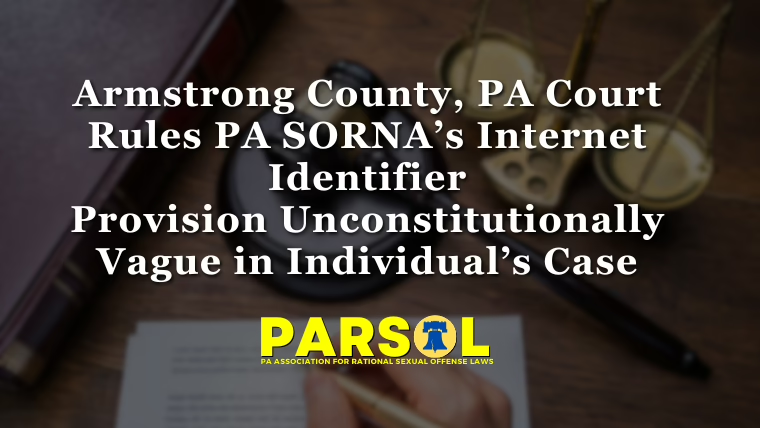Warm greetings from the PARSOL Board of Directors. Thank you for having a look at our Autumn 2021 Newsletter.
Since our last newsletter in July, we have been busy advocating for the dignity of Pennsylvanians who are forced to register. We have also kept a close eye on the legal challenges to PA’s registry that are making their way through the courts. There have been several important developments which we would like to share with you. We will also give you a year-in-review of what we have done.
Call to Action!
Contact US Attorney General’s Office before new SORNA Rule Changes Become Law
In September 2020, the Dept. of Justice was asking the public to comment on the proposed rule changes to SORNA. These rule changes would allow the US Attorney General (AG) to implement federal SORNA requirements to all states. This could mean that many people on the registry would have to register more often, up to 4 times a year, and disclose all internet identifiers.
This rule change was proposed by AG Barr under the Trump Administration. The Biden Administration had halted all policies from the previous administration for further review, but has now decided that these new rule changes can proceed. The final step is for AG Merrick Garland to accept and approve.
The following is taken from the proposal analysis on page 85 FR 49335:
The present proposed rule expands part 72 of title 28 of the Code of Federal Regulations to provide a full statement of the registration requirements for sex offenders under SORNA. It revises the statement of purpose and definitional sections in 28 CFR 72.1 and 72.2. It maintains the existing provision in 28 CFR 72.3 stating that SORNA’s requirements apply to all sex offenders, regardless of when they were convicted, and incorporates additional language in § 72.3 to reinforce that point. It also adds to part 72 provisions—§§ 72.4 through 72.8—articulating where sex offenders must register, how long they must register, what information they must provide, how they must register and keep their registrations current to satisfy SORNA’s requirements, and the liability they face for violations, following SORNA’s express requirements and the prior articulation of standards for these matters in the SORNA Guidelines and the SORNA Supplemental Guidelines.
The idea behind these changes are to make it easier for states to comply with federal SORNA law. Some states are finding it difficult to comply with the federal regulations, or they simply choose not to. If AG Garland accepts these rule changes, the burden to comply with federal SORNA shifts from the state to the individual.
Contact the Attorney General’s Office now at 202-353-1555. Choose Option #1 and leave a polite message saying that you oppose the rule change outlined in Docket No. OAG 157 (AG Order No. 4759–2020).
“I want AG Garland to turn down these proposed changes to SORNA because it infringes on people’s 1st Amendment rights, will place burdens on people who have to register, and creates vague and confusing laws as to how and where people must register.”
It is critical that AG Garland hears from us. For more information, including a video recording of an organizing meeting, visit our partners in California, The Alliance for Constitutional Sex Offense Laws at https://all4consolaws.org/ .
Recent Court Decisions
PA Supreme Court Vacates Cosby Conviction; Torsilieri PA Constitutional Challenge Still Marches Onward; PSP Denied Power to Intervene; Diocese of Altoona-Johnstown Prevail
We have seen quite some exciting rulings out of the Supreme Court of PA (SCOPA) in these past few months. To begin, Bill Cosby’s conviction and sentence for sexual assault was vacated on June 30 due to a breach of contract between him and former Montgomery County D.A. Bruce Castor.
Andrea Constand accused Cosby of sexual assault that occured in 2004. On January 24, 2005, D.A. Castor made a press release informing the public that Cosby was being investigated for sexual assault. Knowing that a criminal conviction beyond a reasonable doubt would be unlikely due to the fact there was no credible evidence (i.e. rape kit), D.A. Castor decided that pursuing financial compensation for Constand through a lawsuit against Cosby was the best route to go.
D.A. Castor, acting on behalf of the Commonwealth, promised Cosby of no criminal prosecutions. The promise of not being criminally prosecuted would make it easier for Cosby to waive his Fifth Amendment right and testify during depositions, admitting guilt, in a civil procedure. Said promise was announced through a press release binding the Commonwealth in a contract. The civil suit was then settled between the two parties.
After D.A. Castor left his office and moved to serving as Montgomery County Commissioner, his former assistant, Risa Ferman, to the position as D.A. She reopened the Cosby investigation; pressed criminal charges of sexual assault; and used the depositions, previously made in the civil suit, against him at trial. A clear breach of contract. The jury found Cosby guilty and the Montgomery County Court sentenced him to the State Dept. of Corrections.
Cosby and his attorneys filed an appeal before SCOPA. Justice Wecht, writing for the majority, wrote: “There is only one remedy that can completely restore Cosby to the status quo ante. He must be discharged, and any future prosecution on these particular charges must be barred.” Cosby was released from the D.O.C. the same day his conviction and sentence was vacated, June 30.
In Commonwealth v. Torsilieri, the PA District Attorneys Association (PDAA) and D.A.s of several counties filed a Petition for Exercise of King’s Bench Jurisdiction. They were trying to force SCOPA to use its power to force an answer on the cases still in the court of common pleas arguing the constitutionality of SORNA based on PA’s Constitution Art. I Sect. 1 Right to Reputation.
These cases are arguing that SORNA’s Legislative Finding of “sexual offenders pose a high risk of committing additional sexual offenses” violates the irrebuttable presumption principle. The argument is to be made in an evidentiary hearing so both sides can provide empirical evidence. The SCOPA Justices unanimously denied the petition forcing the D.A.s to continue with the evidentiary hearings.It’s clear that SCOPA wants to settle this issue with data, which we have plenty of on our side, so that the argument is irrefutable. PARSOL sees the PDAA’s petition as a highly desperate move.
As of this printing, no date has been set for the evidentiary hearing.
The PA State Police (PSP) appealed the Superior Court’s decision in Commonwealth v. H.G.K. to SCOPA. H.G.K was ordered to be removed from SORNA by the York Common Pleas Court. PSP tried to intervene to keep him on by arguing to the Superior Court they have “standing to appear and contest a filing in a court of this Commonwealth which seeks to challenge in any way the obligation of an individual required to register with the [PSP] under this subchapter.” 42 Pa.C.S.A. § 9799.74. The Superior Court quashed the appeal and stated “PSP’s obligations in this case are, and remain, exclusively ministerial in nature, and nothing in the plain reading of the statute indicates that PSP’s responsibilities under SORNA expand beyond the mere ministerial.”
SCOPA granted the case to be argued and heard the arguments but then dismissed the case as “having been IMPROVIDENTLY GRANTED” on June 22, 2021. Meaning the decision to hear the arguments from PSP was granted without adequate consideration and so dismissing the appeal therefore leaving the Superior Court’s ruling to stand. PSP cannot intervene in Court rulings regarding SORNA. PSP is there to execute the law and follow court orders.
Diocese of Altoona-Johnstown and its bishops will not have to pay any financial compensation to Reneé Rice due to PA’s statute of limitations. Rice alleges the Reverend Charles F. Bodziak sexually abused her from about 1974 through 1981. She also alleges the Diocese of Altoona-Johnstown and its bishops knew about the many priests who were committing sexual abuse and covered it up. It wasn’t until 2016, 35 years after the allegations of sexual abuse, that she filed the lawsuit. Civil statutes of limitations in PA range from one to 20 years, with a two-year limit for personal injury claims. There are two exceptions allowed but SCOPA found them non-applicable in this case. SCOPA concluded that “a straightforward application of Pennsylvania’s statute of limitations requires that Rice’s complaint be dismissed as untimely”.
Remember, Our Legal Team has created a handy resource that collects PA Supreme Court Cases concerning sexual offense challenges. This spreadsheet can be found on our website at https://parsol.org/legal-cases/ .
While PARSOL does not give legal advice, you can send an email to josiah@parsol.org with questions about these and other cases working their way through the Courts.
From the Capitol:
Lawmaker outreach and education continue.
PARSOL’s goals when meeting with legislators is education and relationship building. We introduce our organization and we share the idea that registry reform goes hand in hand with what these lawmakers wish to see: a reduction in sexual offenses. From this point of agreement, that we are committed to less people being hurt by sexual crimes, whether online or in person, we can begin to communicate about what is working and what isn’t.
Public sex offense registries are not working. We had a conversation with one mother who works in the Capitol who told us that the registry is so crowded and covers so many offenses, that it is useless to her; she doesn’t know who might be high risk and who has reached the point where they are a minimal risk.
We talk a fair amount about prevention. We need to treat this problem, of online and hands-on sexual abuse, as a public health issue. We point to the example of the AIDS crisis in the 1990’s and the successes we had there: we educated people about what HIV is, what the risk factors are, and how we can best recognize and minimize risk. We implemented programs and resources to help those who had become ill and give them the best chance at living their best lives. Compare this to how we handle sexual abuse: it is largely ignored until a terrible crime is committed, we spend very little time talking about warning signs or proper sexual behavior, and we offer virtually nothing in the way of resources or help for those who are struggling with deviant sexual thoughts. Only after the crime is committed and victims are created do we take action.
If the goal of our elected officials is to keep our communities safe, they are failing by putting all of their hopes and resources behind an ineffective and constitutionally unsound public registry and promoting greater penalties with longer sentences.
The calls for reform of public sex offense registries have never been louder, and it is key that we take advantage of this momentum. Public safety demands that we not remain silent.
For more info on legislation, feel free to send an email to randall@parsol.org . We also have legislative resources on our website www.parsol.org .
New U.S. Sentencing Commission Report
The U.S. Sentencing Commission released a report this September, Recidivism of Federal Offenders Released in 2010. The report supports the notion that risk decreases as offense-free time in the community increases. Although about half of those released were rearrested, sexual assault rearrests accounted for 1.6% of all the rearrests. This helps our argument against the popular belief amongst legislators that “sexual offenders pose a high risk of committing additional sexual offenses”. Such a belief is clearly not universally true as proponents of stiffer sentences and long registration periods would like you to think.
FAQ Corner
Q:What is Subchapter H and Subchapter I?
A: In the case of Commonwealth v Muniz (2016), the PA Supreme Court ruled that the state’s registry had to be modified only for the people who committed sexual offenses before major changes to the registry went into effect on 12/21/2012. Subchapter H is the part of SORNA that applies to people whose offense occurred after 12/20/2012. Subchapter I is the part of SORNA that applies to people whose crimes occurred on or before 12/20/2012. In general, the requirements for people subject to Subchapter I are less invasive.
You can check out our new FAQs page under the Resources tab at parsol.org .
Year In Review
2021 has been a tremendously busy, successful year for us. We have seen progress in organizational outreach. We have connected with the Philadelphia Parole Office, Philadelphia Reentry Coalition, Pennsylvania Reentry Housing Roundtable, and the Attorney General’s Reentry Council just to name a few. Each of these connections have given us the time to educate and inform them of the facts and struggles of the registry.
The Education and Information Committee hosted a virtual screening of UNTOUCHABLE from Sept 10-12 followed by a panel discussion on the 12th. We had a small turnout for the discussion but an impactful one none-the-less. We are working with the UNTOUCHABLE Outreach Director to make it available for our state legislators.
Earlier this year we took the plunge in becoming a 501c(3) non-profit organization. Through months of hard work and much paperwork, our tax exempt status as 501c(3) was granted. We were previously operating as a 501c(4) organization. We can now apply for grants to further our mission.
The Organizational Development Committee had a nice Spring fundraiser. The Fall fundraiser is currently underway. Be on the lookout for that letter or email. We are grateful to all those who gave in the Spring and continue to make sustaining monthly donations. If you have not done so, please consider donating and becoming a member with either a one time donation or a sustaining monthly donation. There’s much that we would like to do in the year to come but only with your help can we do it!
As we close out 2021, the Board of Directors will have their annual in-person meeting in November. The Board will be on vacation in December and will reconvene January of 2022. It will be exciting to get together again in-person for the first time since 2019. We will vote on Board members and officers, update the strategic plan for 2022-2024, and approve the budget for 2022.
Volunteer and Organization Outreach
We continue to be more aggressive in our outreach efforts as we have much planned for 2022. Several people have answered the call. These new volunteers are helping with our community support, legal research, letter writing, and outreach to prisoners.
In our efforts to network with attorneys, volunteers have been mailing out letters. We are currently in talks with one attorney on his role with us. We will give you more information once the details are ironed out.
If you or someone you know would like to support PARSOL or get involved, please see our Volunteer page at https://secure.parsol.org/volunteer/ . You can also give us a call at 717 820 2237 or send us a letter at P.O. Box 399 New Freedom, PA 17349.
Fearless Groups Continue Online
Each month, live online or telephone support is available to those affected by PA’s registry.
Join us on the second Saturday of every month from 4 – 5:30PM as PARSOL hosts a free video / telephone meeting open to all residents of PA who are affected by the public registry. This includes registrants themselves, their family members, and their friends. We aim to create a safe environment free from the influence of law enforcement or treatment providers.
To take part in this one-of-a-kind meeting of people “who get it”, you can either send an email to ashley@parsol.org or call 717 820 2237 .
Tell a friend, or come to the meeting and make one!
In Other News
- PARSOL is now a 501c3. This will make donations easier for those who wish to have a tax write-off.
- Please consider securely donating either at https://secure.parsol.org/donate/ or at our physical mailing address, found below.
- Our Share Your Story section has been updated.
- If you have a loved one who has been negatively impacted by PA’s registry, please visit our site and share your story. Your testimony will help us educate people of the collateral consequences of SORNA.
- We’ve included the NARSOL PA State Wiki page under our Resource tab. Look for PA Laws Regarding Registration.
If you know someone who is serving a sentence, please send them a copy of this newsletter.
If you are incarcerated and there is content that you would like to see in these newsletters or online, please reach out and let us know. You are not forgotten.
Be sure to follow PARSOL on social media and help us spread the word. You can find us at PARSOL on Facebook, @PARSOL7 on Twitter, and PA Association for Rational Sexual Offense Laws on YouTube
Best wishes,
The PARSOL Board of Directors
717 820 2237
PO Box 399, New Freedom, PA 17349.




![stuckIn1995_rally_header - PARSOL - Pennsylvania Assoc for Rational Sex Offense Laws (PA Megan's Law Resources) PARSOL Board Chair Josiah Krammes speaks at the PA Capitol Rotunda flanked by State Reps. Emily Kinkead and Tim Briggs (28 Oct 2025) [John Dawe/PARSOL]](https://parsol.org/wp-content/uploads/2025/10/stuckIn1995_rally_header.avif)